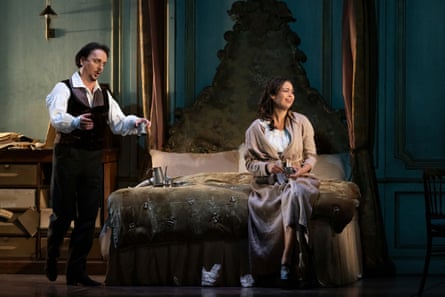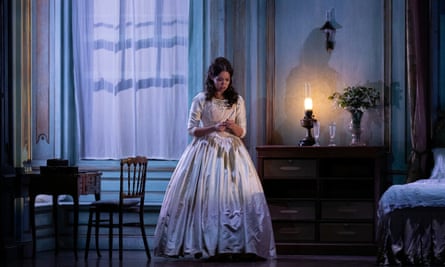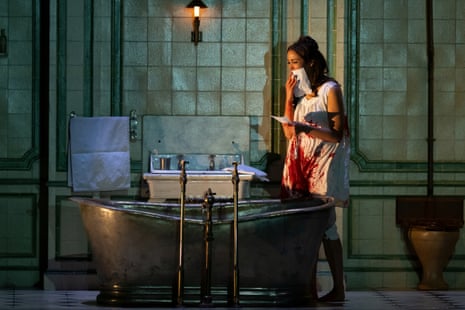These are beleaguered times for opera in Britain. But this revival of Donizetti’s adaptation of Walter Scott showcases one immense reason why opera will outlast its critics: the singing. After acclaim for Asmik Grigorian’s Cio-Cio-San and Aigul Akhmetshina’s Carmen in recent weeks, Nadine Sierra’s Lucia di Lammermoor completes a Covent Garden spring soprano hat-trick. Fact: a new generation of outstanding sopranos are queuing up to sing at Covent Garden. And in some ways Sierra is the best of them all.
Earlier generations tended to see Donizetti’s 1835 adaptation of Scott’s story of feuding families in the Scottish hills as just a vehicle for the coloratura soprano singing Lucia to show off her vocal agility. Maria Callas’s seriousness and dramatic gifts blew that away in the 1950s. Katie Mitchell’s 2016 production, revived here for the second time, deepens and darkens the work still further for the post-#MeToo era.

Mitchell makes the very contemporary insistence that the mad scene at the opera’s centre must be more than a vocal showpiece. It must have dramatically credible causes too. To make this climactic crux work she uses a split-screen staging that contextualises the longings and jealousies of the opera’s tragic triangle. The original story is acted out on one side of the stage, while subplots and background events are simultaneously dramatised on the other. It can be distracting, and when there is a chorus on stage it is restrictive, but it is always thoughtful, never boring, and sometimes shocking. Robin Tebbutt’s revival is excellent.
Lucia di Lammermoor reaches its true stature if what happens on stage matches the inspiration of Donizetti’s score. But it cannot do this without a soprano capable of its leading role. Sierra is emphatically that. Her voice has a thrilling security. She sang Donizetti’s top notes without transposing them down – allied to darker chest voice tones and a cherishable ability to sing softly while still projecting the words, which together enable her to inhabit the searching side of the role. Her opening aria was sensationally good, while her mad scene was not merely vocally breathtaking – sung in a disembodied tone that dovetailed well with Katherine Baker’s flute obbligato – but was also genuinely disturbing to witness.

Sierra’s impact is matched by that of her villainous brother Enrico. Artur Ruciński’s inky baritone is well suited to this dastardly character and he looks the part. Ruciński also has the tricks of the trade when it comes to incisive vocal phrasing and grabbing the ear in ensemble. As Edgardo, Lucia’s beloved and Enrico’s enemy, the Basque tenor Xabier Anduaga makes a more generalised impact. He has a stylish presence but in his big moments – the act one love duet with Lucia (in which Sierra is again superb) and particularly in his final act three aria – Anduaga sometimes pushes too hard and loud.
There are important contributions, theatrical as well as vocal, from Rachael Lloyd as Lucia’s maid Alisa (in this production also her confederate), Michael Gibson as Normanno, and Andrés Presno as the hapless Arturo, who arrives to marry Lucia and is then promptly murdered by her. Insung Sim is a velvet toned Raimondo, the Lammermoor chaplain. Giacomo Sagripanti’s conducting varies between idiomatic and stolid. But this is Sierra’s show. It is simply not a revival to be missed.

Comments (…)
Sign in or create your Guardian account to join the discussion